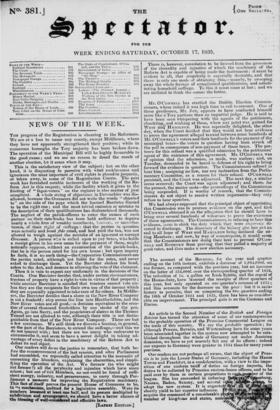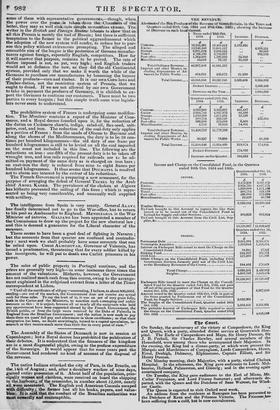An article in the Second Number of the British and
Foreign Review has turned the attention of some of our contemporaries dominion, we have as yet scarcely felt any of its effects: indeed our exports to Germany were greater in 1834 than for many years been associated together in the system now attempted to be esta- blished throughout the whole of Germany not under Austrian the trade of this country. We say the probable operation ; for although Prussia, Bavaria, and Wurtemburg have for some years to the probable operation of the Prussian Commercial League on previous.
Our readers are not perhaps all aware, that the object of Prus- sia is to join the Lesser States of Germany, including the Hanse Towns and Frankfort, in a confederation, with a view to the impo- sition of one uniform tariff of duties on foreign imports, the duties to be collected by Prussian custom-house officers, and to be paid over by them in certain proportions toe ber of the league. She has succeeded in inducing Aemburg,
Nassau, Baden, Saxony, and several o to 4(ae" alt vlf
adopt the new system. It is expect titg% ‘a shortly yield to her superior influence. acquire the command of a considerable number of kingdoms and states, nom* -"dipe some of them with representative governments,-though, when the power over the puese,is takan4rom the ,Charnhers of the latter, they may as well sink into simple monarchies at onoe. The writer in the British and Foreign Review labours to show that in : all this Prussia is merely the tool of Russia; but there is sufficient temptation to the former in the political aggrandizement which the adoption of the new system will confer, to induce her to purs sue this policy without extraneous prompting. The alleged and ostensible aim of the league is the protection of German manufac- turers against foreign, especially English, competitors. How far it will answer that purpose, remains to be proved. The rate of duties imposed is not, as yet, very high ; and English traders would set at defiance the new, as they did the old Continental system, provided only that we make it worth the while of the Germans to purchase our manufactures by becoming the buyers of their products-corn and timber. It is our own Corn-laws and Timber-duties, not the restrictive system of Prussia, that we ought to dread. If we are not allowed by our own Government to take in payment the products of Germany, it is childish to ex- pect the Germans to continue our customers. There must be two parties to every bargain ; but this simple truth some wise legisla- tors never seem to understand.



























 Previous page
Previous page